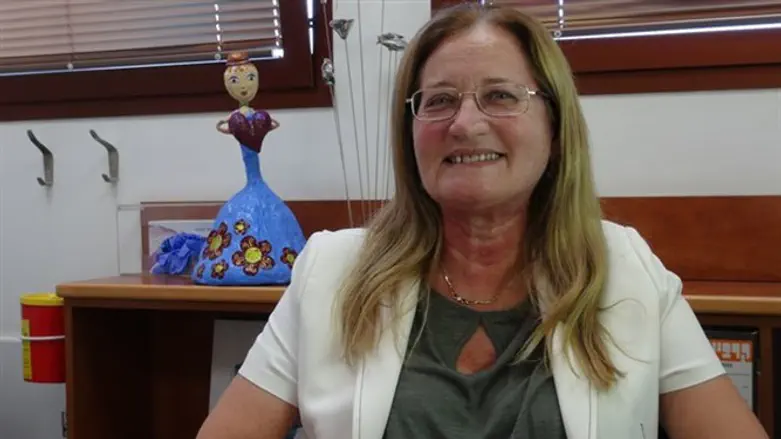
In an interview with Arutz Sheva, Israel Medical Association Ethics Bureau
Chairwoman Dr. Tami Karni related to the overstressed health system, overcrowding in hospitals, and a questionnaire that examined the balance between ethics and medicine among physicians in Israel.
At the beginning of her talk Dr. Karni described the questionnaire in which 11 questions relate to general ethical dilemmas and three sets of deep digging problems, as she put it.
When she listed examples from the questionnaire, Dr. Karni said there were "questions like whether it's right to invest expensive medicine in a dying person, one whose life expectancy is very short. There was also a question about the relationship between the professional need to provide treatment according to the doctors' understanding and the need to provide treatment tailored to the patient's request, as he researched in his own sources, such as Google and others.
"We dug deep into three issues, including the question of quality of life versus longevity; it's a painful and weighty question, because we have the ability to extend life, but the question is what quality of life we will provide. Another question involved telling the medical truth: We're obligated by law to tell the truth, but there are doctors who believe that blurting out the whole truth can hurt the patient - it's a question of telling the truth against compassion.
"The questionnaire was sent to all the doctors of the Israel Medical Association, some thirty thousand doctors, while we assume that 27,000 of them are active doctors. We got about 3,000 answers. The questions were asked also in Europe and North America, and the answers are different," says Karni. "Most of the doctors held it was necessary to act according to proper medical procedure and not according to patient's requests because medicine is not a supermarket.
"Regarding provisioning resources in the medical world, a very painful issue, many doctors said that when there's no long life expectancy, spending a lot of resources on a drug that doesn't add much woudn't be appropriate, rather it's right to invest in other places that will save lives."
According to her, this is rooted in the question "what is the definition of saving lives?" Is it an extra five minutes of poor quality or twenty fertile years? "When we go down to the details, the question arises as to what this term means to 'save lives', after all, it's a cost to vaccinate a large group of children who'll avoid illness and complications. These things must also be taken in consideration."
As for the obligation to tell the medical truth to the patient, Dr. Karni says: "We practice how to tell difficult news, and so on. I was surprised that more than forty percent of doctors said it was right to embellish the truth in different situations. This statement of doctors stems from compassion and from the personal difficulty of a doctor to tell a person bitter news. It's not easy to tell a person something not good that's going to happen to him, and it must be balanced, because the patient mustn't think that information is being hidden from him.
"To embellish the truth - there are those who would call this a lie, and one cannot lie, but to embellish the truth is also in the way one says things, whether all at once or gradually, but bring the patient the data. It's clear that when a patient has to make decisions, he has to get the data right, because according to embellished data he makes unrealistic decisions and we deprive him of his autonomy."
On recent reports that a cure for cancer has been found, Dr. Karni says that for 35 years as a doctor she has heard of such drugs many times and she herself will be happy to meet the drug and its results, but for the time being, these are declarations that don't always justify themselves.
To this she adds that "the end of human life is death. This cannot be prevented. The question is what will be the cause of death and what will be the next illness. I think that if we solve one problem, we'll encounter a second problem. For example, we've extended life expectancy and there are fewer and fewer patients dying of heart disease, which was the leading cause of death, and today many more people die of cancer because they survived heart disease, and I suppose that if we heal that there'll be something else. We're human beings and we all have one end."
About the state of hospitals and the impossible overcrowding, Karni says she is convinced from knowing the reality on the ground that doctors and nurses are doing their best with the most meager means: "We lack about 6,000 beds in Israel. We don't have proper standardization and we don't have enough beds for patients.
"It's no wonder that there's no place in the hallway," she says, "once they talked about the old woman in the hallway without privacy or dignity, and today the crowded beds cause the death of the sick. A doctor considering hospitalization takes into account that due to overcrowding there are infections and death. We need to build more hospitals or expand the existing ones, and raise the number of beds by 6,000 according to the minimum needs, and there are those who speak of 12,000 beds. Each hospital has about 1,000 beds, which means massive construction and mass training.
"You have to open certification because there are doctors who are waiting to work but are left out because they don't have certification. Their entry will enable us to teach another generation of doctors that we're now busy putting out fires. There are no magic solutions. These are costs and the State must make a decision on this matter."